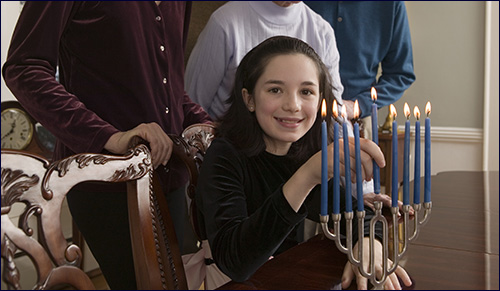 Vampire Weekend's Surprising Jewish Stories
Vampire Weekend's Surprising Jewish Stories


4 min read
Questions and ideas to discuss each night as you light your menorah.
1. The Hanukkah menorah should ideally be placed in a window facing the street in order to publicize the miracle. These tiny flames flicker proudly and proclaim our Jewish identity to our families inside the home as well as to the world outside. These candles proclaim that Am Yisrael chai, the Jewish people live. The mission of the Jewish people is to be a ‘light unto the nations’ (Isaiah 49:6).
Think about how we as individuals and as a community can be a shining example to those around us.
2. The custom is to add one more candle each night. This is because the longer the oil in the Temple burned, the greater the miracle became. The Sages say, “One who does not increase decreases” (Ethics of the Fathers 1:13). Our relationship with Judaism should be something dynamic and growing. Each new candle introduces a fresh and hopefully deeper appreciation of the Hanukkah story and by extension the miracle of Jewish survival.
Think of a way we can enhance our relationship with our heritage.
3. A unique property of a flame is that one can use it to light many more, and when it does so its own light is not diminished. The Talmud similarly says “A lamp for one illuminates like a lamp for a hundred” (Shabbos 122a). We never lose by sharing; in fact, we gain more from giving than from taking. Giving to others helps make the world a better place and in doing so everyone gains.
Think of an extra act of giving we can do with no ulterior motive.
4. The word Hanukkah means dedication as we commemorate the process of the rededication of the Temple. Hanukkah is also related to the Hebrew word for education, chinuch. Jewish education is not just about imparting information; rather, we are educating our children to play their unique role within our community and the world at large. The lights in the Temple were kindled until they were able to burn by themselves. Judaism sees fostering independence as a primary goal of education. When people are empowered to make informed choices, their decisions are much more meaningful.
What is the most important value we would like to impart to future generations?
5. The verse in Proverbs 20:27 likens man’s soul to God’s candle. Judaism views mankind as being created in the image of G-d. Like animals we possess earthly bodies; however, our souls are a spark of the Divine. While the body is nourished by food, the soul draws its sustenance from good deeds. Like the flicker of a flame, the soul strives to reach higher and higher and is a source of light, warmth and comfort to all who draw close to it.
We nourish our bodies at least 3 times a day. Think of something we can do to nourish our souls daily
6. The verse in Proverbs 6:23 likens a mitzvah to a candle and Torah to a light. Judaism views mitzvot as opportunities of infinite value. Each mitzvah is an act that can connect us to God and enrich our lives forever, regardless of what else we do or don’t do. Rather than being all or nothing, Judaism is a journey where every step counts.
Think of a mitzvah to take on or learn more about during these days of Hanukkah.
7. The Maccabees who rose to the challenge through their sheer determination and faith in God were able to bring the Jewish people back from the brink of oblivion. We can never choose what happens to us in life; that is out of our control. What we can do is choose how to respond to those events. What we go through in life is not as important as who we become as a result.
Think of a challenging situation and contemplate the difference between a response and a reaction.
8. On this last night of Hanukkah we reflect on the lessons of the past week. We have learned how a small band of committed people were unwilling to resign themselves to defeat even when all seemed lost. They placed their faith in God and took action even though it seemed futile. This is symbolized by the miracle of the oil - they lit the candles even though they did not have enough fuel. Their trust in God meant that they realized although they had to try their best, ultimately all success is in the hands of Heaven.
Think about the darkest times in Jewish history and draw courage, strength and inspiration from their acts of bravery and determination. What message would our heroes have for us and our personal challenges?
